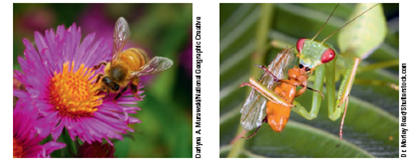
Environmental Science 15th Edition by Scott Spoolman,Tyler Miller
Edition 15ISBN: 978-1305090446
Environmental Science 15th Edition by Scott Spoolman,Tyler Miller
Edition 15ISBN: 978-1305090446 Exercise 15
INSECTS PLAY A VITAL ROLE IN OUR WORLD
We classify many insect species as pests because they compete with us for food, spread human diseases such as malaria, bite or sting us, and invade our lawns, gardens, and houses. Some people fear insects and many think the only good bug is a dead bug. They fail to recognize the vital roles insects play in helping to sustain life on the earth.
For example, pollination is a vital ecosystem service that allows flowering plants to reproduce sexually when pollen grains are transferred from the flower of one plant to a receptive part of the flower of another plant of the same species. Many of the earth's plant flowering species depend on insects to pollinate their flowers (Figure 4.A, left). Also, insects that eat other insects-such as the praying mantis (Figure 4.A, right)-help to control the populations of at least half the insect species we call pests. This free source of pest control is another vital ecosystem service.
Certain environmental changes, some of them caused by human activities, are threatening insect populations and their ecosystem services around the world. Entomologists -scientists who study insects-are expanding their research in areas related to such environmental threats. For example, entomologist Diana Cox-Foster of Pennsylvania State University is studying the decline of honeybees, which are extremely important pollinators.
This decline threatens to disrupt whole ecosystems that depend on bees for pollination, as well as much of the human food supply. We discuss this serious environmental problem more fully in Chapter 8.
Critical Thinking
Can you think of three insect species not discussed above that benefit your life?

FIGURE 4.A Importance of insects: Bees (left) and numerous other insects pollinate flowering plants that serve as food for many plant eaters, including humans. This praying mantis, which is eating a moth (right), and many other insect species help to control the populations of most of the insect species we classify as pests.
We classify many insect species as pests because they compete with us for food, spread human diseases such as malaria, bite or sting us, and invade our lawns, gardens, and houses. Some people fear insects and many think the only good bug is a dead bug. They fail to recognize the vital roles insects play in helping to sustain life on the earth.
For example, pollination is a vital ecosystem service that allows flowering plants to reproduce sexually when pollen grains are transferred from the flower of one plant to a receptive part of the flower of another plant of the same species. Many of the earth's plant flowering species depend on insects to pollinate their flowers (Figure 4.A, left). Also, insects that eat other insects-such as the praying mantis (Figure 4.A, right)-help to control the populations of at least half the insect species we call pests. This free source of pest control is another vital ecosystem service.
Certain environmental changes, some of them caused by human activities, are threatening insect populations and their ecosystem services around the world. Entomologists -scientists who study insects-are expanding their research in areas related to such environmental threats. For example, entomologist Diana Cox-Foster of Pennsylvania State University is studying the decline of honeybees, which are extremely important pollinators.
This decline threatens to disrupt whole ecosystems that depend on bees for pollination, as well as much of the human food supply. We discuss this serious environmental problem more fully in Chapter 8.
Critical Thinking
Can you think of three insect species not discussed above that benefit your life?

FIGURE 4.A Importance of insects: Bees (left) and numerous other insects pollinate flowering plants that serve as food for many plant eaters, including humans. This praying mantis, which is eating a moth (right), and many other insect species help to control the populations of most of the insect species we classify as pests.
Explanation

This question doesn’t have an expert verified answer yet, let Examlex AI Copilot help.
Environmental Science 15th Edition by Scott Spoolman,Tyler Miller
Why don’t you like this exercise?
Other Minimum 8 character and maximum 255 character
Character 255


